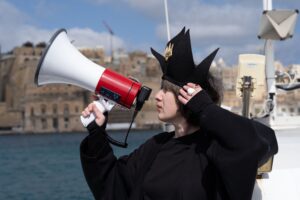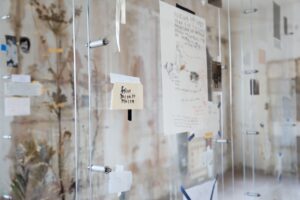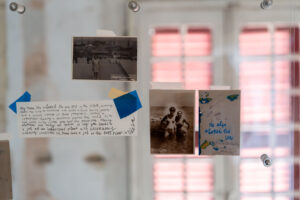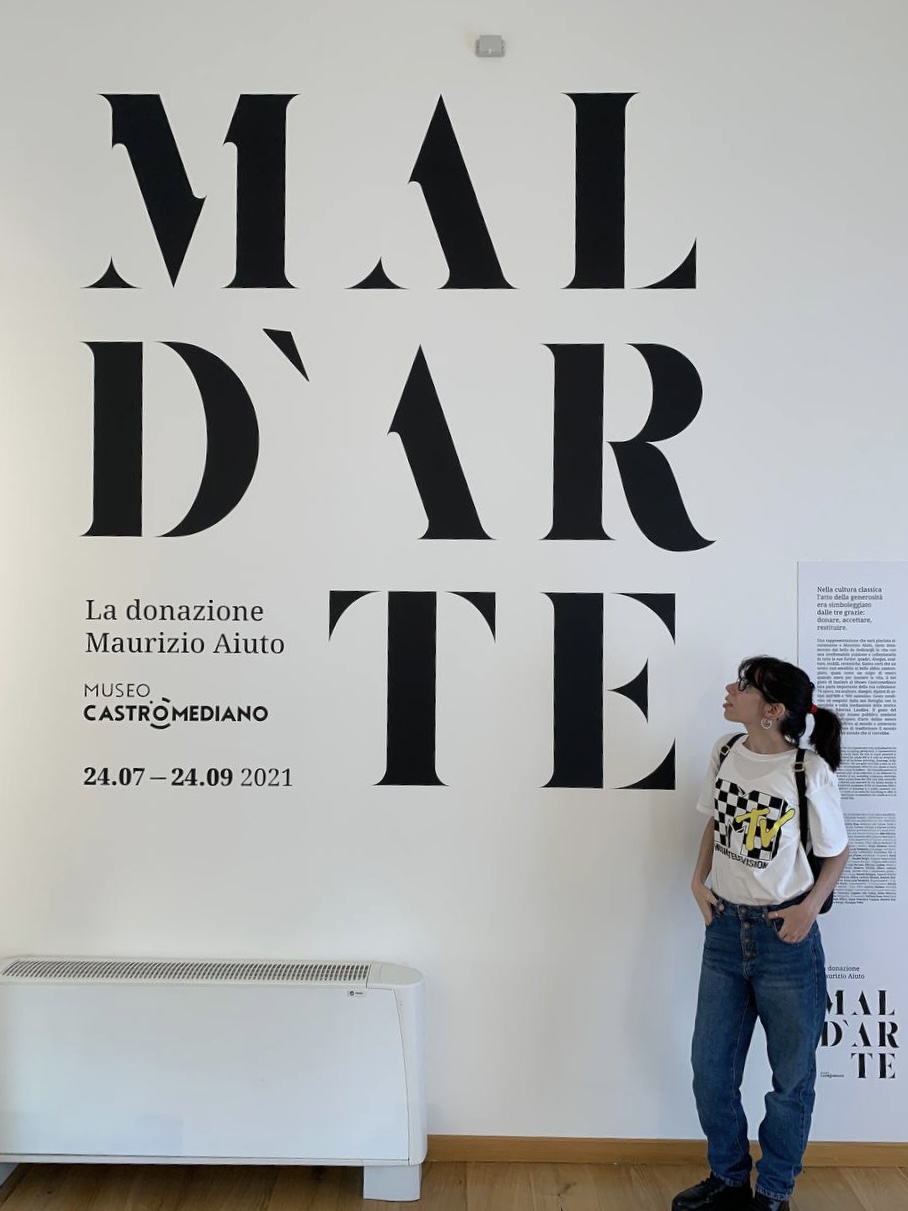The first edition of maltabiennale.art, organized by MUŻA, Heritage Malta and Arts Council Malta and open until 31 May 2024, presents fifteen national pavilions on the island, with a focus on new narratives that reflect on the Mediterranean cultural landscape. The Ukrainian Pavilion explores the theme of decolonization in the context of the Russian invasion and the complex dynamics of the Mediterranean with the project “From South to North”, curated by Kateryna Semenyuk and Oksana Dovgopolova. The invited artist is Alevtina Kakhidze, who created the film All Good? for the occasion, around which the entire pavilion develops. It opens with a map without drawn boundaries, where only the names of the cities that are part of the story are indicated and which is literally crossed by a timeline on plexiglass in which the artist reconstructs her family’s history in fragments as a microhistory influenced and determined by the consequences of the Russian invasion of Ukraine. Designed for Malta, the proposed installation symbolically connects Malta and Odessa, asking us about the possibility of overturning the perception of a history always traced from north to south, in which the imperial port capital Odessa becomes a cultural capital north of the Mediterranean, inviting visitors to reflect on Europe’s shared imperial past and often hidden colonial relationships.

“From Malta to Yalta”. A happening by Alevtina Kakhidze Ukrainian Pavilion at the maltabiennale.art Images by Veronica Santi. The happening “From Malta to Yalta” is part of the maltabiennale.art 2024 Ukrainian Pavilion
Antonella Buttazzo: What was your inspiration behind the “From South to North” project for the National Pavilion of Ukraine at maltabiennale.art?
Kateryna Semenyuk and Oksana Dovgopolova: We were inspired by the concept of maltabiennale.art and its desire to reboot the perception of contemporary European culture and meaning for the entire continent. We understood that the presence of the Ukrainian voice in the international cultural space is crucial, especially when launching a new promising platform. To accomplish this responsible mission, we invited the established Ukrainian artist Alevtina Kakhidze..

Exhibition view of the project “From South to North” Ukrainian Pavilion at the maltabiennale.art. Images by Veronica Santi. The installation “From South to North” is part of the maltabiennale.art 2024 Ukrainian Pavilion
Could you share with us the curation process of this project and how you collaborated with Alevtina to bring it to fruition?
K. S. and D.: First of all, we believe it is important to underline the fact that, as curators, we wanted to take responsibility for ensuring that there was a Ukrainian Pavilion at an important European cultural event, creating a diplomatic space in the center of the Mediterranean as part of a new initiative that starts from important and politically as well as culturally interesting premises, in which we wanted to bring the voice of Ukraine. The position proposed by the curator of maltabiennale.art, as well as the entire organisation, has strongly guided our vision, which is to look at the world we live in from an unconventional perspective, that is, not from North to South but, on the contrary, from South to North or from what is often considered a marginal area compared to what is instead considered a leading area. We believe that this can change the stereotyped perception of the fate of several countries, such as Ukraine itself which is considered by many to be an extension of the “Russian empire”. Here, what we wanted to propose is to look at Ukraine as a state of the north Mediterranean and starting from this vision we asked Alevtina Kakhidze to find an artistic language for the representation of this Ukraine, which she welcomed with a response incredibly powerful by setting out to show the destructive force of the Empire through the fate of her family. The theme of decolonization is the scope of our research but it was not born for Malta, it is a theme on which we have been working for years in Ukraine with our cultural platform for Past / Future / Art memory which is the first promoter of the pavilion together with the National Museum of Fine Arts of Odessa. The Ukrainian Pavilion was then also created thanks to the collaboration with NOS Visual Arts Production and Ukrainian Institute, and created by the NGO Cultural Practices with the support of the IZOLYATSIA foundation, Trans Europe Halles and Malý Berlín, and co-financed by ZMINA: Rebuilding , a program created with the support of the European Union, winner of a tender dedicated to supporting displaced Ukrainians and the cultural and creative sectors, while special partner of the Ukrainian Pavilion is Aromateque.

Exhibition view of the project “From South to North” Ukrainian Pavilion at the maltabiennale.art. Images by Veronica Santi. The installation “From South to North” is part of the maltabiennale.art 2024 Ukrainian Pavilion
The artist declared: «My project wants to tell how the Russian Empire (and perhaps many other Empires, ed.) can influence the history of a family». The film and the installation in fact revolve around a sort of script that proceeds through fragments of her memory starting from the meeting of her parents in Odessa. Her mother from Donetsk (the region where the Russian aggression began in February 2022) arrived in the city to work in a steel cable factory (from an Empire in which it was forbidden to move from one area to another without a permit) driven by the sole desire to live by the sea, while her father, a Georgian, arrived in Odessa to attend the Navy. Alevtina, what are the guidelines for the dramaturgy of the narrative work All Good? In relation to the film, is there any aspect of the backstage that you find important to share?
Alevtina Kakhidze:Actually, I was intrigued to visit some crucial places in the life of my parents in Odessa who are still active, namely the steel cable factory where my mother worked before I was born and the military academy where my father studied to join the infantry of navy. They both loved the sea. The film is a way to question them, I imagined that my father was with me in these places and while I was filming I asked myself what determined the event of their meeting, the sea or the “Russian Empire” which was then the USSR, that is one country for both Georgians and Ukrainians. I was interested in bringing this story into a decolonization perspective, it’s true, but if I think about it, my family never talked about colonization.
A.B: Did you find it difficult to tell this story, which I imagine was painful?
A. K.: When I finished developing the timeline, which I created in five days in Malta, starting from the materials I had brought from Ukraine, and I started looking at the history of four generations of my family, I saw that it was a disastrous story. And when I found myself telling the public what I had reported on the timeline, the various elements and fragments, the photos, the notes, the drawings, the plants, the fabrics and so on, people looked at me as if I were making up the facts. For me, as an artist, it was a way to represent them, simply, for the first time, and to realize that I have no difficulty being in front of them. But it is not a historical representation, neither theoretical nor critical, it is just the story of my family told in a completely personal way. Of course it’s a very sad story, my mother went to work in one of the most dangerous and heaviest factories in the country only to get pregnant and have to return to Donbas to raise me and die exhausted at a checkpoint while returning from a visit to my aunt in Ukraine, which also had a tragic history when her home was destroyed by missiles in a very recent attack. So many harsh and dramatic events can affect just one family.

Exhibition view of the project “From South to North” Ukrainian Pavilion at the maltabiennale.art. Images by Veronica Santi. The installation “From South to North” is part of the maltabiennale.art 2024 Ukrainian Pavilion
A.B.: What message do you hope your project conveys to the audience of maltabiennale.art and beyond?
K. S. e D.: We learn that sometimes art can change perceptions of the world more profoundly than academic research or news headlines. Our project offers the possibility of looking at Ukraine from a different perspective, which is absolutely natural for us: that is, that Ukraine is a state in all respects, a nation-culture-civilization separate from the Russian state. Malta for its part is also an atypical colony, because it does not respond to the main characteristic of “colony” or rather of an occupied and “civilized” place on the other side of the world, of a completely different culture and ethnicity, but it is a very close, they are white people just like the English. For Ukraine it is more or less the same: most Western countries see us and tell us as if we were a Russian colony, and this is so thanks to the narrative that Russia has made about it over the years. The ongoing war is often described as a civil war, while it is an aggression of one country against another, a truly imperial war. Here, we were interested in working on the possibility of contributing to transforming this incorrect narrative.
Info:

After obtaining the high school languages diploma, she continued her studies graduating in Art History at the University of Salento, with a bilingual thesis on the Pre-Raphaelites. Since then, she has been actively contributing as a columnist and collaborator with national blogs and with local magazines and TV programs.






NO COMMENT